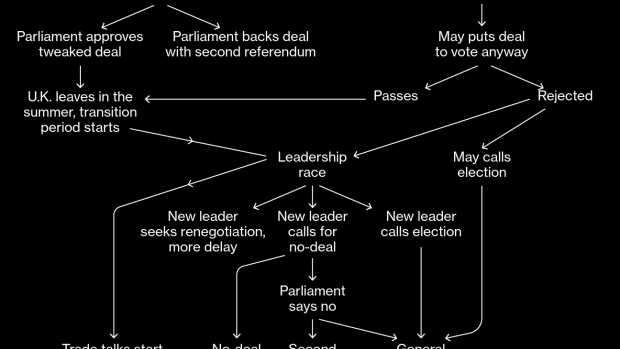May 16, 2019
Key Dates as Theresa May's Premiership Approaches the End
, Bloomberg News

(Bloomberg) -- Theresa May has announced what is probably her final throw of the dice, an attempt to get her central piece of Brexit legislation through Parliament. Here’s how the next few weeks could play out.
Week of May 20
If the government wants to try to bring the Withdrawal Agreement Bill to a vote in the week of June 3, as it says, it ought to publish it this week, and present it to Parliament, for what’s known as its “first reading.” The bill is expected to be huge, but members will have a week off in which to read it. The government hasn’t confirmed when it will be published.
Week of May 27
This will begin with the European election results, on the night of Sunday May 26. The Conservatives are predicted to do very badly. Then there’s a European summit on Tuesday May 28, which isn’t meant to be about Brexit at all, but May is invited. Parliament will be on vacation.
Week of June 3
The government has promised the first vote on the bill, known as the “WAB”, this week. Quite when is a tricky question. Parliament isn’t sitting on the Monday, and is likely to want two days of debate, which takes you to Wednesday June 5. But Donald Trump will be in the U.K. that day, joining May in Portsmouth, on England’s south coast, for D-Day anniversary celebrations. And the next day the pair will be in Normandy, France. Neither of those make it impossible to have a vote, but they do make it trickier, because May will have to get to Parliament to take part. There is also a by-election in Peterborough on June 6, where the Tories could face a difficult night.
It’s theoretically possible that May could win the second reading. That vote is only supposed to be on the principle of the bill, not the detail. A Labour spokesman left open the option of abstention -- though senior Labour figures have since knocked that down and in any case whips would struggle to enforce such a stance. Unless something changes, Labour is on course to vote against, as are many Conservatives. The likeliest outcome is that the bill fails.
Week of June 10
If the WAB is still alive, the government will want to move swiftly to the so-called committee stage, where it’s scrutinized line-by-line. This would probably done in the chamber, open to all members, and would involve lots of amendments, and many votes.
But assuming the WAB is dead, that would probably mean May’s premiership is too. While May has clung on longer than anyone imagined, defying the unwritten rules of British politics, many MPs expect her at this point to announce her resignation as leader of the Conservative Party from the steps of Downing Street. Then the race to succeed her, which has been happening informally for weeks, will go public.
To contact the reporter on this story: Robert Hutton in London at rhutton1@bloomberg.net
To contact the editors responsible for this story: Tim Ross at tross54@bloomberg.net, Emma Ross-Thomas
©2019 Bloomberg L.P.






